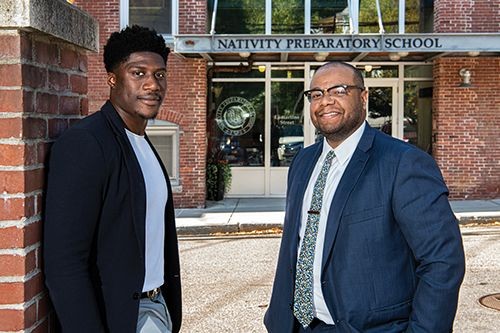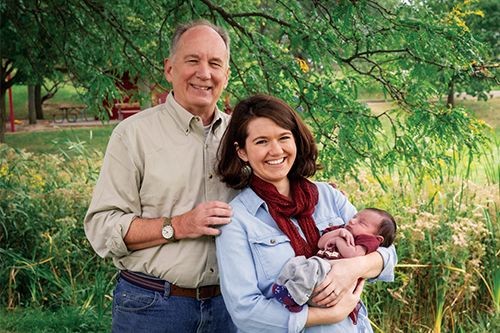The author, photographed in October outside the Pine Street Inn in Boston.
“All right, Boston College, all right, Boston College—more where that came from!” The words cascaded through the crowded lobby of Boston’s Pine Street Inn, rising above the subdued chatter and the slamming of domino tiles on a cafeteria table. It was a cold afternoon in February of 2016, and I was playing dominoes alongside Roger, the best player at the Inn. That’s what he called me—Boston College—and sitting among these dozens of homeless men, it felt as though the privilege of attending BC were plastered on my forehead.
I’d been a PULSE volunteer for nearly a year by that point, and it had taken me months to work up the confidence to play dominoes with the guests. But on that particular afternoon, doing so seemed like the best way for me to connect. And to connect was always the goal. I spent eight hours a week in that crowded Pine Street lobby—where hundreds of homeless men sat at cafeteria tables awaiting meal service and emergency shelter—and each time I walked in, I tried to determine how best I could relate to them.
Back to that I attend Boston College sign on my forehead: Whenever I entered the lobby, I would have to read the room and quickly gauge what the guests in front of me might welcome. For some, it was a smile and a nod of the head. For others, small talk about Tom Brady’s performance last Sunday. Sometimes, it was leaving a guest alone altogether, or simply listening during 90 percent of our interaction. And every so often, it took the form I craved most—genuine conversation. Hearing the life story of one of the men was, to me, the most treasured part of my time at Pine Street.
As a PULSE student, I wasn’t there to put on a hairnet and hand out cafeteria trays across a countertop. I was there to accompany the guests—to simply treat them as just that, guests—and to be present among them. The goal was to extend the simple, human gestures not often afforded to these men—a listening ear, eye contact, compassion—and in so doing, to build relationships that transcended the typical boundaries and stigmas associated with homelessness. But, this was certainly not easy. There were many days when I’d leave that busy shelter lobby with feelings of uncertainty, guilt, frustration, or sadness, feelings I’d process with my fellow PULSE volunteers on the T ride back to the Heights. On the other hand, there was nothing quite like the joy of sharing a genuine connection with a guest and watching that relationship grow each week. I shared conversations with these men about joy, suffering, loss, regret, hope, and what we all cherish most in life.
Although no BC PULSE student could solve homelessness or take away the trauma experienced by these men, the one thing we could do was offer our presence—showing up consistently and maintaining an open heart. That could take the form of anything from dominoes with Roger to a cherished, meaningful conversation. It was all about us extending simple gestures of love toward one another, of recognizing our shared humanity. To be a part of this legacy, to be among the thousands of PULSE students who have showed up consistently and opened their hearts for fifty years, will always be one of my most valued experiences. And as PULSE looks to the future, I can’t help but defer to my dominoes partner and say, “All right, Boston College—more where that came from!”






